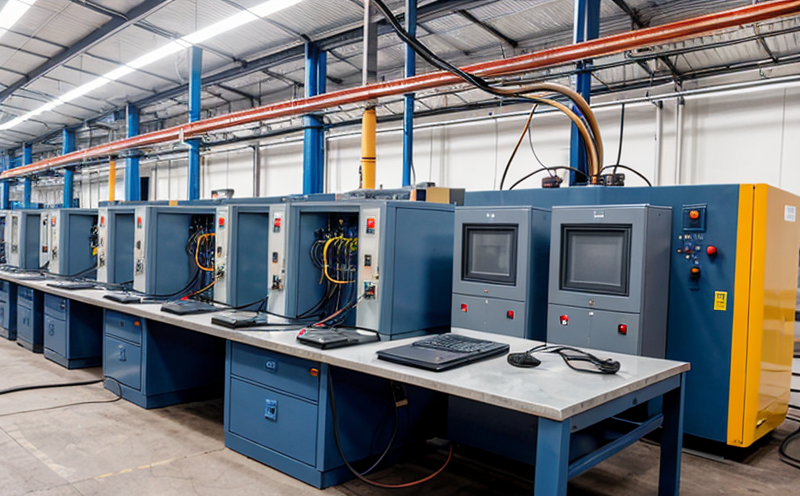IEC 62933 Energy Storage Systems Testing in Control Applications
The IEC standard IEC 62933 provides a framework for the testing and certification of energy storage systems (ESS) used in control applications. This service ensures compliance with international standards, which is essential for the safety, reliability, and efficiency of ESSs across various industrial sectors.
The standard covers the functional, electrical, thermal, mechanical, and environmental performance tests required to verify that an ESS meets its design specifications under controlled conditions. By adhering to these stringent requirements, manufacturers can demonstrate compliance with global regulations and ensure their products are suitable for integration into complex control systems.
Testing according to IEC 62933 is particularly critical in industrial manufacturing and processing environments where energy storage plays a key role in optimizing operations, reducing costs, and enhancing sustainability. The standard ensures that the ESS can withstand harsh operating conditions while maintaining high levels of performance and reliability.
The testing process involves several stages, starting with specimen preparation. This includes configuring the ESS to simulate real-world operational scenarios and ensuring all components are functioning as intended before testing begins. Once prepared, the system undergoes a series of tests designed to assess its ability to operate within specified limits under various conditions.
The core aspects of IEC 62933 include:
- Functional performance: Verifying that the ESS operates correctly and efficiently in control applications.
- Electrical performance: Ensuring safe and reliable electrical characteristics, including voltage stability, current flow, and power factor.
- Thermal management: Assessing the system’s ability to manage heat effectively under load.
- Mechanical integrity: Checking that mechanical components remain intact during operation.
- Environmental resilience: Evaluating how well the ESS performs in extreme conditions such as temperature fluctuations, humidity, and vibration.
Detailed instrumentation is used throughout this testing process to monitor critical parameters. This equipment allows for precise measurement and analysis of each test parameter, providing robust data that can be used to refine designs and improve product quality.
Upon completion of the tests, a comprehensive report detailing all findings and results is generated. This document serves as proof of compliance with IEC 62933 and helps stakeholders understand the performance capabilities of the tested ESS in control applications.
In summary, adhering to IEC 62933 ensures that energy storage systems are robust, reliable, and safe for use in industrial settings. This service is indispensable for quality managers, compliance officers, R&D engineers, and procurement teams looking to ensure their products meet international standards and can integrate seamlessly into complex control systems.
Applied Standards
The IEC 62933 standard incorporates numerous other internationally recognized standards that enhance its effectiveness. These include:
- ISO 12127-1:2010 - Safety of machinery - Electrical equipment and systems used with machines, part 1: General principles for design.
- ISO 15548-1:2017 - Safety of machinery - Protection against electrical hazards in the event of a fault - Part 1: Basic concepts, terminology and general requirements.
- IEC 61851-20-21 - Power supply systems for electric vehicles - Particular characteristics of power supply systems - Part 21: Electrical loads and fault conditions.
- IEC 62884-1:2021 - Energy storage systems for electric vehicles - Part 1: General requirements.
These standards, when combined with IEC 62933, form a comprehensive suite of guidelines that address all aspects of energy storage system safety and performance. Compliance ensures not only regulatory adherence but also enhanced product reliability and longevity in demanding industrial environments.
Industry Applications
| Application | Description |
|---|---|
| Renewable Energy Integration | ESSs tested ensure seamless integration of solar and wind power into existing grid infrastructure. |
| Industrial Automation | Supporting the automation of manufacturing processes through reliable energy storage solutions. |
| Data Centers | Maintaining stable power supply during peak loads and ensuring continuous operation. |
| Transportation | Enhancing fuel efficiency in electric vehicles by optimizing battery usage. |
| Hospitality | Providing uninterrupted power to critical facilities, such as hotels and resorts. |
| Farm Automation | Supporting precision agriculture with stable energy supply for farm equipment. |
| Telecommunications | Maintaining reliable communication networks by ensuring consistent power flow. |
The wide range of applications underscores the importance of robust testing protocols like those outlined in IEC 62933. Each application requires specific performance criteria, and thorough testing ensures that energy storage systems meet these needs effectively.
Quality and Reliability Assurance
The process of ensuring quality and reliability through IEC 62933 involves multiple stages:
- Initial Design Review: Evaluating the design specifications to ensure they align with international standards.
- Component Testing: Conducting tests on individual components before integration into the complete ESS.
- Integration Testing: Ensuring that all components work harmoniously as a single system.
- Final System Testing: Verifying overall performance and compliance with IEC 62933 requirements.
Throughout these stages, continuous monitoring and adjustment are necessary to maintain high standards of quality. This approach guarantees that the final product not only meets but exceeds expectations in terms of reliability and safety.
The use of advanced instrumentation and software tools facilitates accurate measurement and analysis during each stage. These technologies provide real-time data that can be used to identify potential issues early, allowing for corrective actions before full-scale testing begins.
Once all tests have been completed successfully, a detailed report is generated summarizing the findings. This document acts as a comprehensive record of the system’s performance and compliance with IEC 62933, offering valuable insights to stakeholders involved in the project.





